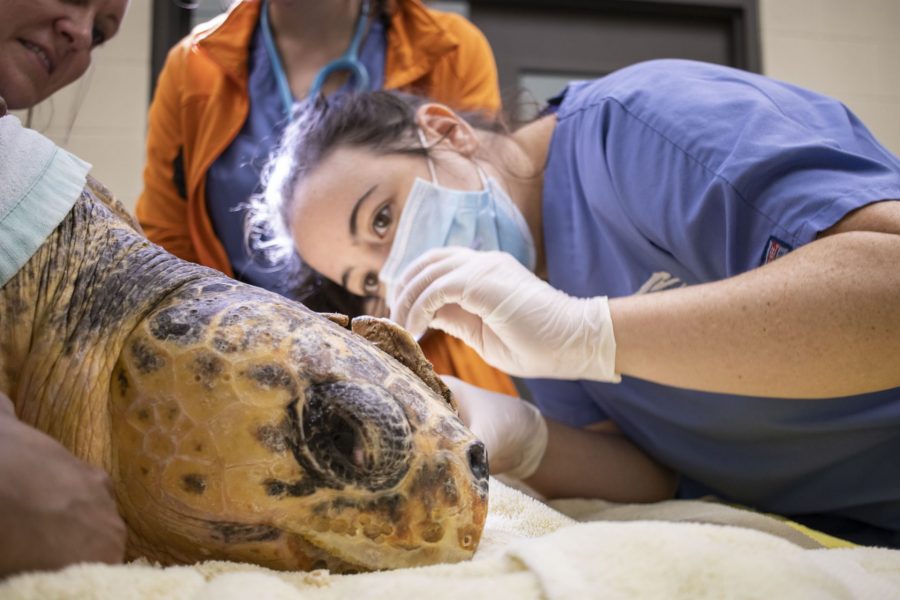

Staff veterinarian Kyle Donnelly examines sea turtle patient, Cinnamon.
This International Day of Women and Girls in Science, we wanted to introduce you to a few of our Zoo team members and get their insights on their fields. There are so many ways for women and girls to use their science degrees to impact the people and animals around them!
Meet Kyle Donnelly, our staff veterinarian! To read more of our Women in Science profiles, check out this link.
Education: I got my Bachelors of Science, then went to vet school where I obtained my Doctorate of Veterinary Medicine and Masters of Public Health. After graduation I did two internships for specialty training, followed by a residency in zoological medicine. I became a Diplomate of the American College of Zoological Medicine in 2019.
How did you choose your field? I am interested in wildlife conservation and thought about the many ways I could have an impact in this field such as pursuing a PhD, but ultimately chose veterinary medicine because of the variety and breadth of work it allows me to participate in.
Did or do you have any female mentors or role models in your field? If so, how did they shape your career journey? My mentor Kathy Quesenberry at the Animal Medical Center in NYC molded the way I practice veterinary medicine early in my career. She taught me how to stick up for myself, appreciate the subtleties of exotic animal medicine and push the boundaries of what is possible both in treatment and research. I still look up to the veterinarian and leader she is today.
How would you describe your work at the Zoo? I provide all veterinary care to the zoo animals, rehabilitating sea turtles, conservation projects (including Florida grasshopper sparrows, Perdido Key beach mice, and Florida scrub jays), as well as patients at the Florida Wildlife Hospital. My work ranges from routine check-ups to treatment of injury and disease, as well as research that contributes to the understanding of wildlife disease and treatment.
What do you enjoy about your job? My favorite part of my job is having an impact on local conservation and wildlife. I subscribe to the “Think globally, act locally” worldview where I am able to participate in the care, research, and reintroduction and release of sea turtles, Florida grasshopper sparrows, Perdido Key beach mice and the rehabilitation of all kinds of native Florida wildlife. My work with the Zoo animals also has larger meaning by keeping these animals healthy for the public so our community can appreciate them and want to conserve them.
What are some challenges about your work? Zoological medicine is a complex field where there is a lot of unknown information about the patients I work on as well as challenges associated with getting that information. For example, tiny patients such as a dart frog or a grasshopper sparrow do not have enough to blood to safely collect for a full diagnostic panel, and the large patients like rhinos and giraffe are too big to x-ray or ultrasound through, so I often have to get creative with diagnosis and treatment.
What advice do you have for girls or women who want to work in your field? Stay curious about the world around you and work hard.
Brevard Zoo is an independent, not-for-profit organization that receives no recurring government funding for our operating costs. Your generous support enables us to continue to serve our community and continue our vital animal wellness, education and conservation programs.
